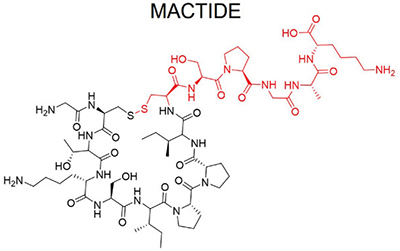
MACTIDE is an engineered peptide with the sequence G(CTKSIPPIC)SPGAK-OH, featuring a disulfide bond between Cys2 and Cys10. This structural design enhances its stability and affinity for the CD206 receptor, also known as the mannose receptor, predominantly expressed on M2-like tumor-associated macrophages (TAMs). By targeting these macrophages, MACTIDE plays a pivotal role in modulating the tumor microenvironment, particularly in triple-negative breast cancer (TNBC) models.
Functionality and Biological Importance:
• Enhanced CD206 Binding: MACTIDE incorporates a trypsin inhibitor loop from Sunflower Trypsin Inhibitor-1 (SFTI-1), resulting in a 15-fold increase in binding affinity to the CD206 receptor compared to its predecessor, mUNO. This modification also confers a 5-fold increase in proteolytic stability, prolonging its half-life within tumor environments.
• Selective Targeting of M2-like TAMs: By binding specifically to CD206, MACTIDE effectively homes to M2-like TAMs, which are known to promote tumor progression and suppress immune responses. MACTIDE homes to M2-like TAMs when given intravenously, intraperitoneally, and even orally.
Applications in Research:
• Therapeutic Delivery: MACTIDE serves as a targeting moiety for delivering therapeutic agents directly to CD206+ TAMs. For instance, conjugating MACTIDE with Verteporfin, an FDA-approved drug, has demonstrated efficacy in slowing primary tumor growth and reducing lung metastases in TNBC models without the need for light activation.
• Diagnostic Imaging: Fluorescently labeled MACTIDE can be utilized to visualize and monitor the distribution of M2-like TAMs within tumors, aiding in the assessment of tumor progression and the effectiveness of therapeutic interventions.
• Immune Response Modulation: Administration of MACTIDE has been associated with increased infiltration of cytotoxic lymphocytes, such as CD8⁺ T cells and natural killer (NK) cells, into the tumor microenvironment. This enhances the body's immune response against tumor cells, contributing to the suppression of tumor growth and metastasis.
MACTIDE represents a significant advancement in targeted cancer therapy research. Its enhanced binding affinity and stability, coupled with its ability to selectively target and modulate M2-like tumor-associated macrophages (TAMs), underscore its potential as a valuable tool in developing novel therapeutic strategies for aggressive cancers, such as triple-negative breast cancer. |